Elvis Presley
Eight:
I concluded my first post taking on Nolan Dalla’s challenge with this statement. The second you see the word “seminal” appear you should immediately stop reading. I will not describe this album with that word, and my disgust for that word comes most from its use talking about this album.
While it is true that perhaps no other album since its release, is more befitting of that word, the word seminal derives from the word semen, and writers of various talents with or without agendas have indeed jizzed all over this album more than any release in history usually with a clear and ill informed agenda.
Large numbers will tell you that this is the only legitimate music Elvis Presley made in his career and the only music of his that should be listened to at all. They will tell you it had little to do with Elvis Presley. Mostly, those people never listened to or understood this album either.
Accurate use of the world seminal refers to what did come later. People misuse the word as a synonym for zenith, when it really more accurately refers to opening a door. I do not believe that this was Elvis Presley’s zenith, but it did not just open the door to nearly everything, it defiantly and forever smashed down the notion that there should be any doors at all.
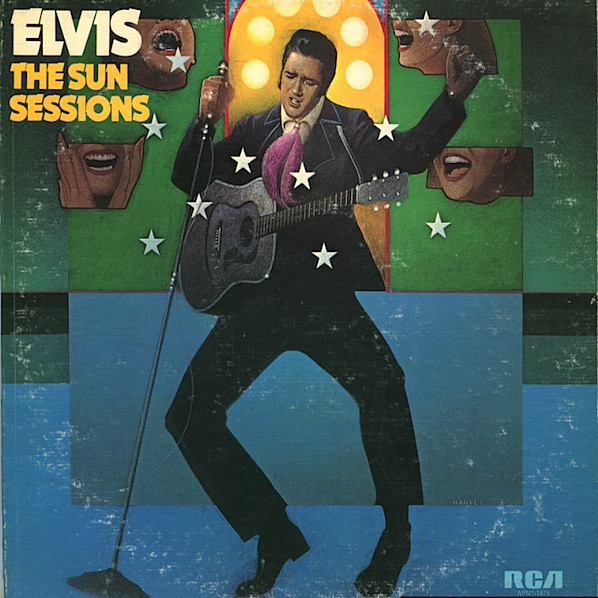
Elvis Presley, Scottie Moore, and Bill Black. Sam Phillips producing and egging them on.
16 songs only three have drums.
Elvis plays rhythm guitar on all of them and ferociously.
He plays piano, his best instrument, on “Trying to Get to You”
Without a doubt creates Rockabilly here, and it was never topped.
Creates Rock and Roll too. Ignorant people will yell “cultural appropriation,” which criminally occurred a lot, but not here not even for a second.
Elvis Presley grew up poorer than any significant musician white or black ever. He also knew and loved nearly every single blues, country, gospel (white and black), standard, and pop song ever recorded. He watched everyone of any color he could every moment he could, which often meant being the only white kid in a black church, the only white kid sneaking into a black nightclub, hanging out at hillbilly bars or picnics, or wherever any music was being played whether he could afford to get in there legitimately or not.
Chuck Berry mixed country with rhythm and blues first, but not as audaciously as this. This sounded like something from another planet. Indeed even a hack comedian knew.
Rock and roll was fathered by black Blues and Rhythm and Blues. It’s mother was white as can be country music (don’t forget that Charlie Parker loved country music).
This was called miscegenation back then and it was frowned upon. Violently frowned upon!
Some ignoramus will point out that Elvis did not write a single one of these songs, but does that really matter?
Let’s do some before and after:
Now do those two songs sound like they come from the same galaxy?
Do you have any idea how revered version A was and what a capital crime it was to those who saw it as gospel never be fucked with ever?
Do you know what balls it took turn A to B, much less attempt to play it at the Grand Ole Opry?
Only one man alive had the temerity to do that. His name was Elvis Presley and he was 19!
Upon hearing that Sam Phillips reportedly said “Boy, that’s fine, that’s fine. That’s a pop song now!”
Now the world owes Sam Phillips a lot, but with Elvis comes ignorance, and here is perhaps the most ignorant thing I’ve ever seen written about Elvis, which I sadly found by accident looking for the exact wording of the above quote. It’s there merely for citation, there is little reason to read it.
The Man Who Invented Elvis: Sam Phillips (1923-2003)
“Go back to that summer’s day in 1953, when Phillips first heard that voice. He wanted Elvis, but he didn’t want him singing “My Happiness.” Nobody needed a one-man Ink Spots, or a hillbilly Eddie Fisher. “I always said,” Phillips told everybody, “that if I could find a white boy who could sing like a black man I’d make a million dollars.” So he steered Mister Eclectic away from everything but one particular corner, and Elvis, as always, said, “Yes, sir.” Imagine if Phillips had said, Sure, kid, how about a couple more Ink Spots covers, and that “Stranger in Paradise” from “Kismet’s” pretty nice, and you’ve got the pipes for it, and how about we round things out with a little Eddie Fisher. There would have been no rock-and-roll Elvis, and nothing for RCA to buy up. It would never have occurred either to them or him.”
Let’s analyze that paragraph.
Elvis did record “My Happiness” on July 18, 1953. He paid $3.25 to do it, which must have been a fortune to him. Sam Phillips was not there. Marion Keisker was and she helped him record his acetate, which was how Sam Phillips made money on the side when he was not recording black artists.
Sam Phillips did in fact record “Rocket 88,” which many wise people consider to be the first Rock and Roll record ever.
Supposedly, Philips did say this in 1952, “If I could find a white man who sings with the Negro feel, I’ll make a million dollars.”
But always look at the source when you are hearing about history, and always remember that nearly every memoir or interview sets history on that subjects terms.
So who says that Sam said that? Mostly, Sam.
Marion Keisker was taken by Elvis Presley for some reason. Probably, not by that recording, which he said was intended as a gift for his mother, but was really an attempt to impress Sam Phillips. There’s really nothing special on that recording. Maybe Keisker was taken by the boy’s good looks, his unique clothing (although he may have been wearing his Crown Electric uniform), or his hair and sideburns.
There was some talk that day.
She said, “What kind of singer are you?”
He said, “I sing all kinds.”
She said,”Who do you sound like?”
He said,”I don’t sound like nobody.”
Remember that quote, because it is perhaps the most epic and true thing ever said by a singer.
“I don’t sound like nobody.”
Elvis was not much for public statements, but at some point he also said this:
“People ask me where I got my singing style. I didn’t copy my style from anybody . . . . Country music was always an influence on my kind of music.”
And this:
“When I was a child I was a dreamer. I read comic books, and I was the hero of the comic book. I saw movies, and I was the hero in the movie. So every dream I have ever dreamed has come true a thousand times.”
This is who he always wanted to be:
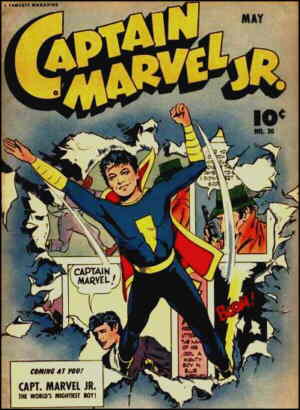
So yeah, Elvis was initially a shy kid, but he knew what he wanted. He wanted to be a superhero and well before he walked into Sam Phillips’ business.
Now that eventually led to this, which you can trifle with if you want to:
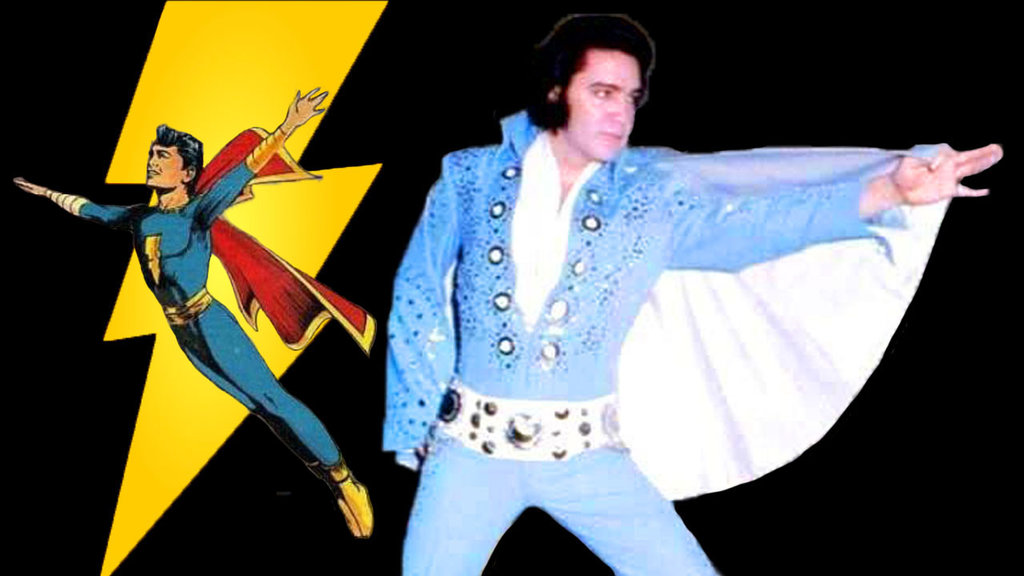
But that was 20 years or so later, and only showed he never forgot who he always wanted to be. By that time he WAS a superhero performing for very large crowds and he dressed the part.
While he was at Sun he did dye his hair black like Captain Marvel Jr., and he dressed like this. In fact, he had been dressing like that since high school. His clothes and his hair/sideburns brought him so much derision there that the people that kept him safe like “Red” West were kept by his side until the day he died. Shy, yes. Fearless, definitely.
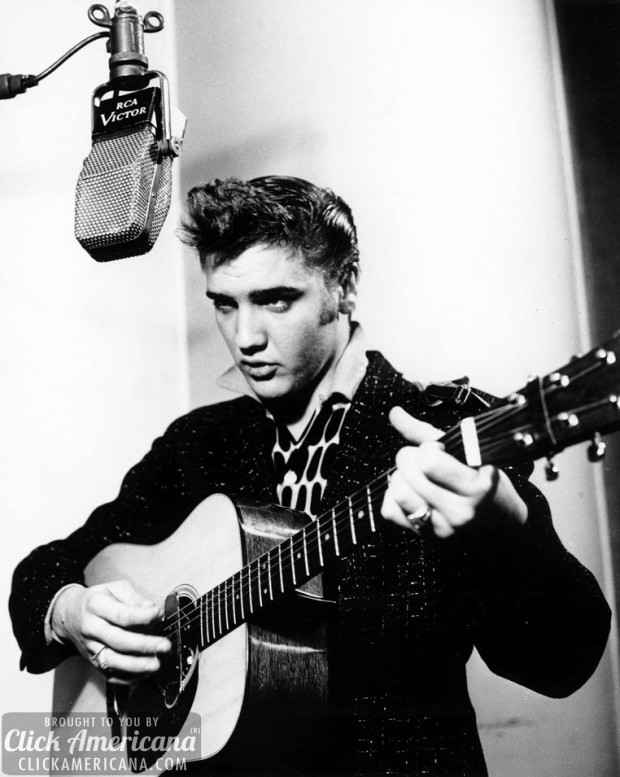
In fact, I defy you to show me a single photo of Elvis pre-Army, where his clothing was anything less than the pinnacle of cool other then when Steve Allen spitefully forced him to wear a tuxedo, and Tom Parker allowed it to happen. What happened after was that the very polite and nice Elvis Presley was very pissed off.
Where did a young Elvis first shop? Lansky Brothers.
Bernard Lansky first noticed a young Elvis Presley checking out the store’s window displays in the spring of 1952. He invited Elvis to come in and shop, but the young king declined, saying he didn’t have any money. As the story goes, Elvis told him, “When I get rich, I’ll buy you out,” and Bernard replied, “Do me a favor: Don’t buy me out, just buy from me.”
Indeed Marion Keisker kept reminding Sam Phillips about the odd kid who sounded like nobody. He did say as he was criticized for in the above idiotic article that Dean Martin was his favorite singer, but he loved more singers than you and your friends combined can name, and again he never said that he wanted to sound like Dean Martin, he said he wanted to sound like himself.
In the meantime, if Sam was searching unsuccessfully for a white man with a Negro feel there is very little evidence of it. Where are the recordings of his failures?
At some point Sam did hook Elvis up with Scotty and Bill and told them to see if they could put some stuff together and on July 5, 1954, Sam actually had them in the studio.
It is also true that when Sam asked Elvis to do something he did say “Yes, sir,” and comply. Not because he was a rube with no point of view, but because he was as Ed Sullivan would one day say, “a real decent, fine boy,” one who had been raised to be polite and respect his elders.
But Sam Phillips did not push Elvis to sing black. He likely had no idea that Elvis knew more about black music and indeed white music than him. In fact Sam sat there making Elvis sing dreck for hours with frustrating results.
It was only when a disgusted Sam, and the only person he should have been disgusted with was himself, told Elvis to take a break, at which point Elvis decided to have some fun and did so the way he always did so. He said to Scotty and Bill do you know this “Big Boy” Crudup song. He started to play that blues song in his own style which was as much country as blues, and Bill Black was always up for a good time. Scotty Moore was capable of joining in and keeping up, at which point Sam Philips did overhear and said something to the effect of “What the fuck was that” and at that point the world indeed turned from black and white to color.
This happened with a song with “mama” in the title by perhaps the biggest “mama’s boy” of all time.
More before and after:
And there was thunder and lighting and the world was never again the same, and this was said and it was true.
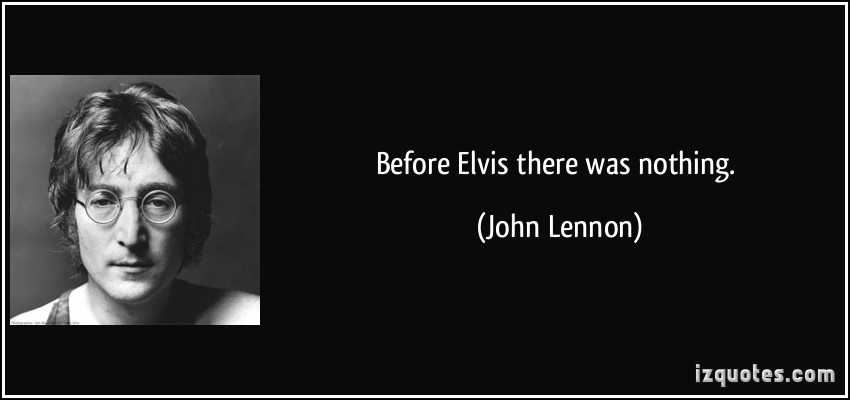
Now if you listen to both of those, you will initially think that “Big Boy’s” sounds more rock and roll and Elvis’ sounds more country, but again that is the point and the big picture.
That boy was told by Tom Parker, the man who would “help” make him a star while at every point sabotaging him as an artist, “Son, right now you’ve got a million dollars worth of talent, a year from now you’ll have a million dollars.”
Same figure from both men and both came in much lower than the truth.
Sam Philips did in no way have the distribution capabilities to handle a star of that magnitude and knew it.
He sold Elvis and those 16 songs to RCA for $35,000. He will claim he had Carl Perkins as a hedge, and he will claim that Carl Perkins were it not for a car accident would have been bigger than Elvis, but Carl Perkins was not Elvis and would never be Elvis.
That’s no knock on Carl Perkins, in fact via George Harrison, Perkins had more influence on the Beatles’ music than Elvis did. In fact, the Beatles would record and release three Carl Perkins songs and none by Elvis Presley. The Beatles may have wanted to sound like Elvis Presley at some point, but few people could and they knew they couldn’t.
So yeah, $35,000, not a million, but that was seed money and there was a ton of talent around Sam at the time. Not just Carl, but Jerry Lee, Johnny, and Roy.
In 1969 Sam Phillips sold Sun, and he made more than a million dollars doing it.
Much has been written about these sessions, much good, more drivel. Everyone, who writes will say that these recording are essential. They will say that everything that has ever been done since is somewhere in these sessions and that is for the most part true.
Perhaps the best thing Lester Bangs spit out from his typewriter was upon Elvis’ death in 1977. “We will continue to fragment in this manner, because solipsism holds all the cards at present; it is a king whose domain engulfs even Elvis’. But I can guarantee you one thing: we will never again agree on anything as we agreed on Elvis.”
So yeah all music writers agree on the Sun Sessions, but how many actually listen to these songs. I know that I do.
My favorite thing about these recordings is that when Elvis, Scotty, and Bill went on tour to show them off many a promoter said, “I was told that I was getting the whole band on the records” only to be told accurately that the whole band on those records was standing in front of them.
Fourteen year’s later, the also very soft spoken and polite, Scotty Moore asked Elvis for a favor, it is a repeat of the only favor he ever asked of Elvis in all of their time together. Elvis gladly replies, and they are nothing if not fiercer by then.
Nine:
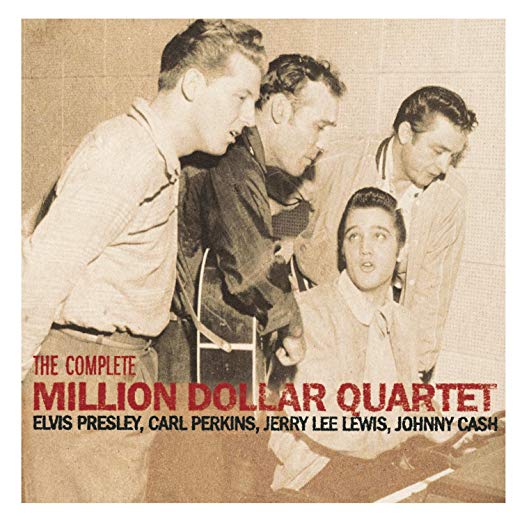
The most misunderstood and easily the most impossible to properly purchase album on this list. If you do, try to find this one released in 2006, the 50th anniversary of its somewhat accidental recording, and make sure it has 47 and only 47 tracks on it.
December 4, 1956, Elvis and a girlfriend stop by Sun Records to say hello to some friends.
Elvis is at this point a huge star. Elvis appeared on “The Ed Sullivan Show” on September 9th of that year. Ed was not there. He was in the hospital recovering from a car accident. Much 50’s rock and roll lore involve car and train accidents, which is appropriate because in sound and subject matter R&B was trains, R&R was cars and would eventually morph into airplanes and jets. So much of the history of 20th Century music is about wanting to go somewhere else, and the ones that did, did so through their music.
60 million people watched, 82.6% of the people watching TV that night. Ed should have been overjoyed. Ed instead was upset and scared and had every reason to be.
Elvis had released an incredible two sided single “Don’t be Cruel/Hound Dog” that year. “Don’t Be Cruel” had hit number one on the country, rhythm and blues, and pop charts, which is what likely happens when 60 million people see you sing something on TV, although it hit number 1 on all of those charts before he sang it on TV that night.
When Elvis stopped by Sun that day, Carl Perkins was recording what would eventually become “Matchbox.” A little known Jerry Lee Lewis was there to add his considerable piano skills. Johnny Cash, who had a couple country hits, was there loitering around for some reason either to watch Perkins or maybe just to get away from the hassles of his home life.
Sam Phillips had pretty much made all the money he would make from Elvis by that time, but he did have promotional skills and he did understand the concept of synergy, whether that term had been used in its present context by then or not.
Mostly, he wanted this photograph, which appeared the next day in the Memphis Press-Scimitar under the headline “Million Dollar Quartet.”
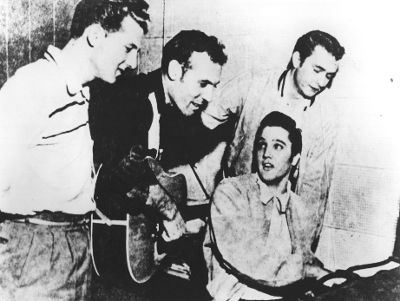
That catchy headline led to numerous myths and stories, and eventually a Broadway show that is probably very entertaining, despite having no semblance of reality.
That’s the nature of things. I don’t recommend it, but if you want to watch the movie “CBGB” you will see all the people who played there performing their very famous “hit” songs flawlessly, which in no way ever happened.
Luckily on that day, Elvis was more interested in hanging out, sitting at the piano, and discussing his musical passions than he was in renting out an entire amusement park for him and his girlfriend.
Fortunately, the engineer Jack Clement, was savvy enough to turn on his recording equipment.
Those tapes were then not sent to the Library of Congress or some other appropriate place. They probably were not even treated with the somewhat disdainful respect that the Ark of the Covenant was.
Now that is a cinematic homage to “Citizen Kane.”
In the case of the above recordings, at least the sled was not incinerated.
Once Elvis sat down at the piano. Johnny Cash may or may not have left. In his memoir, he said he was there the whole time, but we’ve already discussed the accuracy of memoirs.
If you want to scour the recordings for evidence of his presence good luck. Even if you are a careful, studious listener you will not be able to tell if he sang anything that day or not. People have scoured those tapes and they are likely somewhere wasting their time arguing about it in one of their mom’s basements, which I’m actually not saying is a waste of time.
Carl Perkins played and sang along. Jerry Lee Lewis sang, but for most of the time was clearly going insane that he was not the one at the piano.
These recordings have been released in numerous shitty fragments, in numerous shitty packages, over and over and over again. So be careful that you wind up with exactly what I told you to wind up with above.
Then don’t expect to find something of musical brilliance that will jump out at you. None of these 47 tracks were ever played on a commercial radio station. The Elvis Channel on Sirius probably does not play much from them, although they may play them in their entirety from time to time, which is the only legitimate way to listen to them.
It is exactly what The Rock and Roll Hall of Fame jam sessions were before they were filmed and televised, and exactly why those now televised events are as awful as they are.
90% of it is Elvis sitting at the piano playing off the top of his head whatever he feels like playing for as long as he feels like playing it. It is 100% undeniable evidence that every idiotic thing that has been said about the man and his music are untrue.
Jerry Lee did get to play at some point, and those are perhaps the only cuts that actually are complete and end. Elvis may or may not have been there when they were recorded.
There are 14 tracks that are less than a minute. One is five seconds long. Amazon will charge you $1.29 to download each separately, if you are silly enough to do that, and hey if you are silly enough to spend $1.29 on even an essential 5 seconds when you can buy the whole thing for $14.99 then you deserve to; have too much money; and should send me some of it on PayPal. The more you send, the longer I will write a thank you back about how genius you are and how much you appreciate good music good (just an alternate suggestion, but pay the $14.99).
There is a lot of talking. All of it is joyous, and there is a lot of laughter.
There are a ton of gospel songs that you have never heard, most songs that few people other than Elvis had ever heard.
It starts out with four clunky instrumentals, one of a “song” that can’t be identified. Two are Christmas songs, one the most profitable thing ever written by a Jewish composer, the other “Jingle Bells.”
The fifth song Elvis sort of sings “Reconsider Baby.”
After that had the owner of the seediest nightclub in town given his appraisal, he would tell Elvis and Carl that neither were cut out to be in music more harshly than Simon Cowell ever did on “American Idol” and indeed again Jerry Lee is silently watching saying “why the hell am I not the center of attention!”
But then this happened.
Elvis is raving about Jackie Wilson before anyone else knew who Jackie Wilson was!
Elvis: I heard this guy in Las Vegas. Billy Ward and his Dominoes. There’s a guy out there who’s doin’ a take-off of me; “Don’t Be Cruel.” He tried so hard, till he got much better, boy; much better than that record of mine.”
He could have called it something derogatory, but he called it a “takeoff” not a “theft” and it is described accurately here:
Rebecca Explains from “Jackie Wilson Lovers”
“Note that Elvis says that the singer is doing a ‘takeoff’ of him. I hardly ever hear that term anymore, but it was common in the Fifties. Rather than being an impersonation, a ‘takeoff’ indicated that an artist approached something by adopting and adapting someone else’s performance: starting with an exaggeration, perhaps, of some features of the original, then proceeding to improve on the original, making the performance unique.”
So listen to Elvis compare what he calls the “Yankee don’t ta” to his southern “doan a” and hear him marvel at the way Jackie pronounces it “telee-phone,” which the other southern guys dig too.
Elvis could have taken that six minutes to brag about his historic hit song, instead he spends it talking about how he dug Jackie Wilson so much he went to see him four nights in a row.
Elvis at the time was making his first appearance in Las Vegas, and now Elvis is Las Vegas, but then he flopped in front of the New Frontier Hotel’s “middle aged” audience.
This was the Bill Willard of the Las Vegas Sun’s opinion of his short run.
“Elvis Presley, arriving here on the wave of tremendous publicity, fails to hit the promised mark in a desert isle surfeited with rock and rollers who play in shifts atop every cocktail lounge on the Strip. The brash, loud braying of his rhythm and blues catalogue (and mind you, they are big hits everywhere it seems), which albeit rocketed him to the big time, is overbearing to a captive audience. In a lounge, one can up and go—fast. But in a dining room the table-sitter must stay, look, and listen the thing out. Which is perhaps why Presley received applause on his opening show edged with polite inference only. For the teenagers, the long, tall Memphis lad is a whiz; for the average Vegas spender or show-goer, a bore. His musical sound with a combo of three is uncouth, matching to a great extent the lyric content of his nonsensical songs.”
Elvis went from closing the show to opening it for Shecky Green.
Sam Cooke mostly played what was called “Chitlin Circuit,” but he dreamed of playing the Copa and did. Sam Cooke’s performances at the Copa, and there is a live album, were very different than his “Chitlin Circuit” performances, which have also been documented.
When Elvis flopped that first night he never once considered adjusting. When you saw Elvis, you saw Elvis.
Now he could have felt sorry for himself, with his fame and looks there were plenty of young, pretty girls available for commiseration. He could have taken advantage of what Vegas probably had plenty to offer, instead he met, goofed around, and compared clothing with Liberace, and went to see an unknown Jackie Wilson four nights in a row!
Who knows who else Elvis could have or did see in the two frustrating weeks he spent in Las Vegas. Frank Sinatra? His “favorite singer” Dean Martin? Elvis likely knew of Billy Ward and his Domino’s from their hit “60 Minute Man” and other songs that were sung by their previous lead singer Clyde McPhatter, who left to form the Drifters.
Wherever they were playing, Elvis was there and unaware that their new singer was doing a medley of his songs. Whoever else was playing in Vegas at the time, Elvis found the most talented guy there and talked non-stop about him for years.
Elvis and Jackie Wilson became very good friends and whenever Jackie Wilson’s career was flagging Elvis was there to help him out.
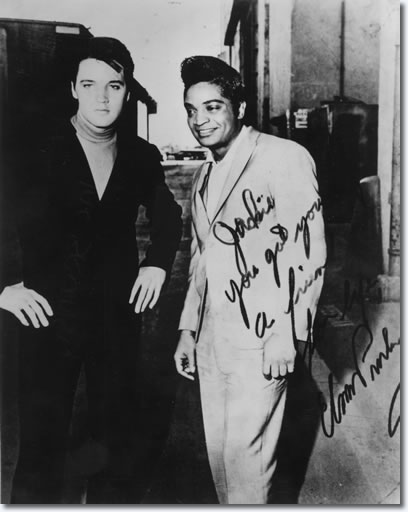
If you can’t read the inscription, it says “Jackie, you got yourself a friend for life.”
So in this case the guy initially being influenced was in fact the black guy, who then influenced the white guy, and then they went back and forth influencing each other for years.
Jackie Wilson’s first solo single “Reet Petite” came out in 1957 and was written by a “little known” songwriter named Berry Gordy. It sounds very much like an Elvis Presley song. Gordy, had been for a time among a group of boxers being trained by a guy who would become the legendary Eddie Futch. All of those kids became champions except Berry Gordy, but Gordy continued to write songs for Wilson and used that money to found Motown.
As to who took what from whom (does it really matter?) this is what Jackie had to say about it.
“I took as much from Elvis as he took from me … A lot of people have accused Elvis of stealing the black man’s music, when in fact, almost every black solo entertainer copied from Elvis.”
Those six minutes of the “Million Dollar Quartet” album soon led to this, which shows how much love Elvis had in him and how funny he could be, and how it wasn’t about him, it was truly about the JOY of the music. So indeed listen to how he sang “telephone,” watch him smile into the camera (they couldn’t cut that off) and give a nod to the only person he really wanted to notice it in that gigantic audience.
After a long set of gospel numbers, there is more hillbilly appreciation for black artists.
In five seconds, you can hear that Jerry Lee Lewis knows and loves all the words to Chuck Berry’s “Too Much Monkey Business,” which was potentially the first rap song and definitely had a whole lot to do with Bob Dylan’s “Subterranean Homesick Blues” existing. There is still enough time in those five seconds left to hear Carl Perkins agree out loud that he likes it too more than once.
They then spend many minutes sharing their love for Chuck’s “Brown Eyed Handsome Man” and take turn singing their favorite parts. They sing it like it was a country song, because indeed Chuck Berry mixed country into the Louis Jordan R&B he potentially stole too. Both Lewis and Perkins would eventually record it.
They all seem to love this stanza:
Milo Venus was a beautiful lass
She had the world in the palm of her hand
But she lost both her arms in a wrestling match
To get brown eyed handsome man
They do however pronounce it “rasselling,” and they very likely know that the real title of Chuck’s song referred to his skin color and that Milo Venus was in all likelihood white.
Elvis can’t remember what the exact count was when the brown eyed handsome man hit his home run at the end of the song, but you can bet your net worth that he understood the first line “Arrested on charges of unemployment,” because his own father was also arrested for almost exactly that.
Elvis never thought this way for a second, but Jerry Lee Lewis who grew up as close as a brother to his cousin Jimmy Swaggart, thought he was going to hell for mixing white and black, Elvis likely convinced him it was worth it.
Dick Clark very famously insisted that all the artists on American Bandstand lip sync instead of perform live, which led to the loss of what would have been a ton of essential performances. Dick Clark would not have made it though the instrumental version of “Jingle Bells” here, but everything that follows it puts you right into Elvis, Jerry Lee and Carl’s minds (and mindsets) and that is truly essential.
Related Posts
 Sort of Taking on Nolan Dalla’s Essential Album Challenge with Elvis content
Sort of Taking on Nolan Dalla’s Essential Album Challenge with Elvis content Ray Flanagan: Exactly as I wanted to hear him
Ray Flanagan: Exactly as I wanted to hear him Uptight Sugar’s David Hamilton: Talk about the Passion
Uptight Sugar’s David Hamilton: Talk about the Passion The Sandinista of Joe Strummer Salvos
The Sandinista of Joe Strummer Salvos Essential Albums: Marvin Gaye’s Here My Dear
Essential Albums: Marvin Gaye’s Here My Dear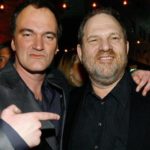 Once Upon A Time in Hollywood: The Dream Is Over
Once Upon A Time in Hollywood: The Dream Is Over
